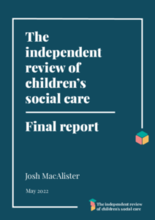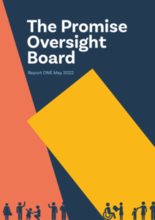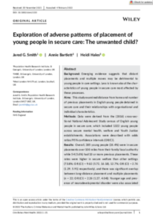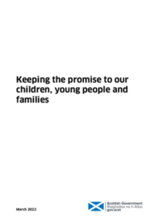Displaying 181 - 190 of 1185
This report is a culmination of an independent review of the UK's care system in order to build recommendations for how the system can be improved and to continue feeding in a wide range of views. The work and outcomes of the review were guided by the views of people that have lived experience of the children’s social care system in the UK.
This is the first report from The Promise Oversight Board on progress that Scotland is making to keep the promise. It was a promise made to care experienced infants, children, young people, adults and their families. It was also made to families who live around the ‘care system’ and whose lives are impacted by its decisions. The promise made reflects a commitment that had already been made through the National Performance Framework - that every child grows up loved, safe and respected and able to realise their full potential.
People in England and Wales must now be aged 18 and over to get married.
A record number of children and young people in England have sought mental health support, according to new analysis.
This study looked at how well matched children in England are to their homes and the extent to which their participation, views, wishes and feelings are considered in the decision-making process. The study looked at a small group of children who have a very wide and diverse set of needs and who live in children’s homes that were visited by Ofsted inspectors in late 2019.
Emerging evidence suggests that distant placements and multiple moves may be detrimental to young people in care settings. Less is known about the characteristics of young people in secure care most affected by these processes. This UK study examined distance from home and number of previous placements in English young people detained in secure care and their relationships with organisational and individual characteristics.
This study aimed to use longitudinal data pertaining to children who had been adopted from care to examine the relationship between being adopted from care and psychological trauma.
Hundreds of lone child refugees have been housed in Home Office hotel accommodation branded “unacceptable” by Ofsted despite ministers pledging to end the practice last year, it has emerged.
The Scottish Government Implementation Plan sets out the Government of Scotland's actions and commitments to Keep the Promise for care experienced children, young people and their families. The plan lays out what the government will do to Keep The Promise by 2030. The goal is for every child in Scotland to grow up loved, safe and respected so that they realise their full potential.
Sixteen and 17-year-olds in Scotland will not be placed in young offenders institutions, under new plans. The Scottish government said it wanted to end the placement of under 18s in custody "without delay". Instead, ministers said they would fund "care-based alternatives" and shift the approach from "one of punishment to one of love and support".






